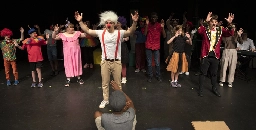SENSE Theatre study finds play participation increases social skills in autistic youth
SENSE Theatre study finds play participation increases social skills in autistic youth
Together with the Vanderbilt Kennedy Center and ACM Lifting Lives, SENSE Theatre recently presented a two-night performance of the play Circus del Sé, written by Blythe Corbett, PhD, James G. Blakemore Professor of Psychiatry and Behavioral Sciences.

Together with the Vanderbilt Kennedy Center and ACM Lifting Lives, SENSE Theatre recently presented a two-night performance Circus del Sé. Written by Blythe Corbett, PhD, James G. Blakemore Professor of Psychiatry and Behavioral Sciences and director of the SENSE Lab, the play about a young boy with aspirations of joining the circus featured 12 typically developing peer students and actors and 12 children with autism. Through theatrical games and role play, they entertained the crowd and, according to a study published the Journal of Consulting and Clinical Psychology, sharpened their social skills in measurable, meaningful ways. One in 36 children in the United States have autism spectrum disorder, a neurodevelopmental condition that effects cognitive function, communication and social skills. "The purpose of the study was to see if SENSE Theatre, a unique social skills program that includes trained typically developing peers, theatrical techniques and active performance of a play, can enhance social competence in youth 10 to 16 years of age with autism spectrum disorder," said Corbett, who was the principal investigator. The final sample in the study involved 207 autistic youth from Vanderbilt University Medical Center, University of Alabama and Stonybrook University who were randomized to SENSE Theatre® or Tackling Teenage Together, an active control treatment condition. "The findings show that the interactive theatrical intervention enhances social salience for relevant social information, such as faces, and this increased social interest results in greater motivation to engage with others," Corbett said. "As clinicians, it is important to consider novel ways to treat social skills beyond individual and group didactic approaches. Moreover, it is valuable to develop and study innovative ways to provide treatment for our patients that may otherwise be overlooked."
This summary was generated by Smmry